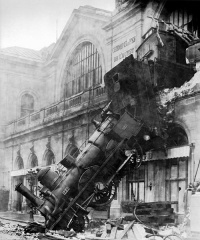Invention
From The Art and Popular Culture Encyclopedia
| Revision as of 09:04, 28 August 2007 WikiSysop (Talk | contribs) ← Previous diff |
Revision as of 23:11, 18 December 2014 Jahsonic (Talk | contribs) Next diff → |
||
| Line 1: | Line 1: | ||
| - | {{Template}}As Paul Virilio has noted, every new [[invention]] has a downside which we are unwilling to acknowledge in the name of [[progress]]: the invention of automobiles inaugurated car-[[crash]]es; the invention of nuclear energy, [[Hiroshima]] and [[Tchernobyl]]. The technologies of instant communications have invented [[pure war]]. | + | [[Image:View from the Window at Le Gras.jpg|thumb|left|200px|''[[View from the Window at Le Gras]]'' is one of [[Nicéphore Niépce]]'s earliest surviving photographs, circa [[1826]].]] |
| + | [[Image:Train wreck at Montparnasse 1895.jpg|thumb|right|200px| | ||
| + | An example of the [[integral accident]]. | ||
| + | <br>Illustration: ''[[Train wreck at Montparnasse]]'' ([[October 22]], [[1895]]) by Studio Lévy and Sons]] | ||
| + | {{Template}} | ||
| + | |||
| + | An '''invention''' is a new composition, [[device]], or process. An invention may be derived from a pre-existing model or [[idea]], or it could be independently conceived in which case it may be a radical breakthrough. In addition, there is '''[[cultural invention]]''', which is an [[innovative]] set of useful [[social behavior]]s adopted by people and passed on to others. Inventions often extend the boundaries of human knowledge or experience. An invention that is [[novelty (patent)|novel]] and [[inventive step and non-obviousness|not obvious]] to [[person skilled in the art|others skilled in the same field]] may be able to obtain the legal protection of a [[patent]]. | ||
| + | ==Downside of inventions== | ||
| + | :''[[integral accident]]'' | ||
| + | As [[Paul Virilio]] has noted, every new [[invention]] has a downside which we are unwilling to acknowledge in the name of [[progress]]: the invention of automobiles inaugurated car-[[crash]]es; the invention of nuclear energy, [[Hiroshima]] and [[Tchernobyl]]. The technologies of [[instant communication]]s have invented [[pure war]]. | ||
| + | |||
| + | == See also == | ||
| + | <div style="-moz-column-count:2; -webkit-column-count:2; column-count:2;"> | ||
| + | * [[Creativity]] | ||
| + | * [[Creativity techniques]] | ||
| + | * [[Diffusion of innovations]] | ||
| + | * [[Discovery (observation)|Discovery]] | ||
| + | * [[List of inventors killed by their own inventions]] | ||
| + | * [[Mad scientist]] | ||
| + | * [[Mind's eye]] | ||
| + | * [[Multiple discovery]] | ||
| + | * [[Technology]] | ||
| + | * [[The heroic theory of invention and scientific development]] | ||
| + | * [[Timeline of historic inventions]], for a detailed list of inventions, listed by date of invention | ||
| + | </div> | ||
| {{GFDL}} | {{GFDL}} | ||
Revision as of 23:11, 18 December 2014


Illustration: Train wreck at Montparnasse (October 22, 1895) by Studio Lévy and Sons
|
Related e |
|
Featured: |
An invention is a new composition, device, or process. An invention may be derived from a pre-existing model or idea, or it could be independently conceived in which case it may be a radical breakthrough. In addition, there is cultural invention, which is an innovative set of useful social behaviors adopted by people and passed on to others. Inventions often extend the boundaries of human knowledge or experience. An invention that is novel and not obvious to others skilled in the same field may be able to obtain the legal protection of a patent.
Downside of inventions
As Paul Virilio has noted, every new invention has a downside which we are unwilling to acknowledge in the name of progress: the invention of automobiles inaugurated car-crashes; the invention of nuclear energy, Hiroshima and Tchernobyl. The technologies of instant communications have invented pure war.
See also
- Creativity
- Creativity techniques
- Diffusion of innovations
- Discovery
- List of inventors killed by their own inventions
- Mad scientist
- Mind's eye
- Multiple discovery
- Technology
- The heroic theory of invention and scientific development
- Timeline of historic inventions, for a detailed list of inventions, listed by date of invention

